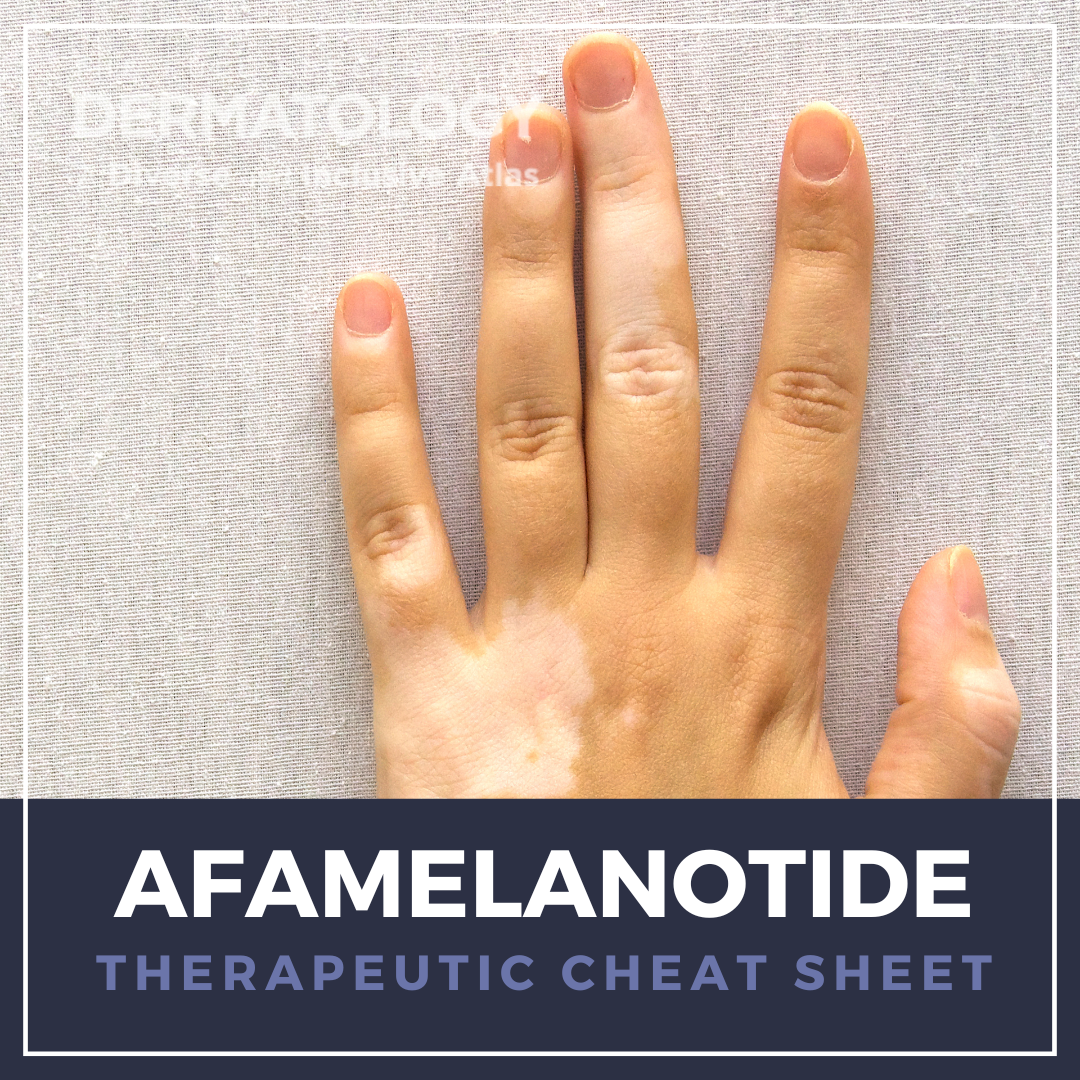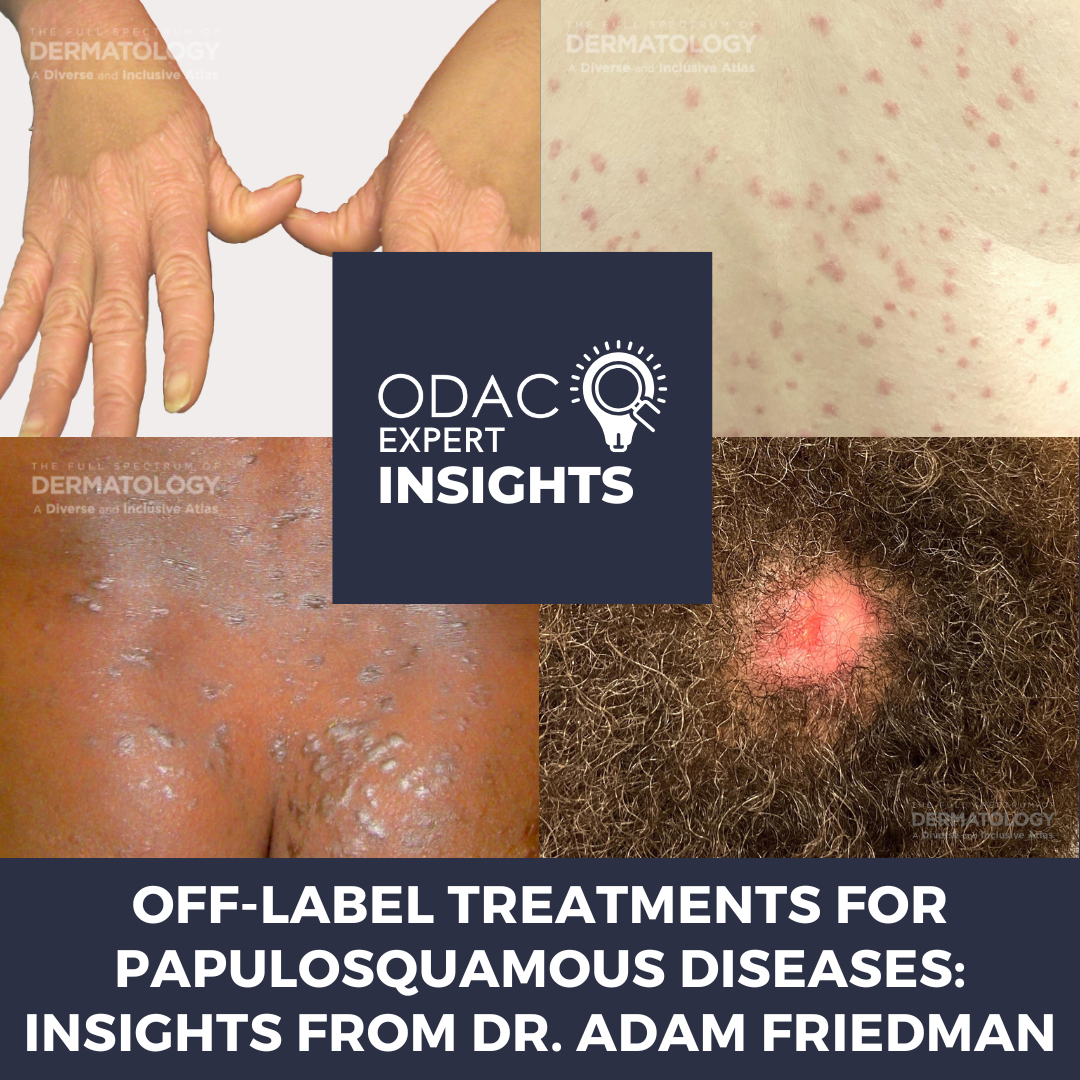Afamelanotide Therapeutic Cheat Sheet
 Photosensitive skin conditions can result in cutaneous and systemic symptoms that can have a marked effect on quality of life due to ubiquitous UV exposure. Erythropoietic protoporphyria, for example, can cause severe photodermatitis, excruciating burning and neuropathic pain, nausea, and deep-rooted fear of sunlight that leads to debilitating lifestyle modifications such as remaining indoors. We …
Photosensitive skin conditions can result in cutaneous and systemic symptoms that can have a marked effect on quality of life due to ubiquitous UV exposure. Erythropoietic protoporphyria, for example, can cause severe photodermatitis, excruciating burning and neuropathic pain, nausea, and deep-rooted fear of sunlight that leads to debilitating lifestyle modifications such as remaining indoors. We …
 Photosensitive skin conditions can result in cutaneous and systemic symptoms that can have a marked effect on quality of life due to ubiquitous UV exposure. Erythropoietic protoporphyria, for example, can cause severe photodermatitis, excruciating burning and neuropathic pain, nausea, and deep-rooted fear of sunlight that leads to debilitating lifestyle modifications such as remaining indoors. We …
Photosensitive skin conditions can result in cutaneous and systemic symptoms that can have a marked effect on quality of life due to ubiquitous UV exposure. Erythropoietic protoporphyria, for example, can cause severe photodermatitis, excruciating burning and neuropathic pain, nausea, and deep-rooted fear of sunlight that leads to debilitating lifestyle modifications such as remaining indoors. We … 

 At the 2025 ODAC Dermatology Conference, Dr. C. William Hanke, MD, MPH, Professor of Dermatology, Marian University COM in Indianapolis, and triple board-certified in Dermatology, Pathology, and Micrographic Dermatologic Surgery, presented on procedural treatments for preventing nonmelanoma skin cancer (NMSC). His lecture highlighted innovative approaches to reducing this risk through various cosm …
At the 2025 ODAC Dermatology Conference, Dr. C. William Hanke, MD, MPH, Professor of Dermatology, Marian University COM in Indianapolis, and triple board-certified in Dermatology, Pathology, and Micrographic Dermatologic Surgery, presented on procedural treatments for preventing nonmelanoma skin cancer (NMSC). His lecture highlighted innovative approaches to reducing this risk through various cosm …  At the 2025 ODAC Dermatology Conference, expert dermatologist Anthony Fernandez, MD, PhD presented a masterful talk on Advances in Psoriasis Treatment: Emerging Therapies and Future Directions. He explored emerging therapies and future directions in psoriasis management. Since 2004, the FDA has approved 14 novel systemic agents to treat moderate to severe psoriasis, 12 of which are biologics, an …
At the 2025 ODAC Dermatology Conference, expert dermatologist Anthony Fernandez, MD, PhD presented a masterful talk on Advances in Psoriasis Treatment: Emerging Therapies and Future Directions. He explored emerging therapies and future directions in psoriasis management. Since 2004, the FDA has approved 14 novel systemic agents to treat moderate to severe psoriasis, 12 of which are biologics, an …  Dermatology clinicians who treat inflammatory skin conditions in patients with skin of color should have a keen eye. Next Steps in Derm, in partnership with Skin of Color Update, interviewed Dr. Brandi Kenner-Bell, assistant professor of dermatology and pediatrics at Northwestern University Feinberg School of Medicine. Watch as Dr. Kenner-Bell shares what to look for when diagnosing inflammatory s …
Dermatology clinicians who treat inflammatory skin conditions in patients with skin of color should have a keen eye. Next Steps in Derm, in partnership with Skin of Color Update, interviewed Dr. Brandi Kenner-Bell, assistant professor of dermatology and pediatrics at Northwestern University Feinberg School of Medicine. Watch as Dr. Kenner-Bell shares what to look for when diagnosing inflammatory s …  At the 2025 ODAC Dermatology Conference, we had the privilege of hearing from Dr. Adam Friedman, a renowned expert in dermatology and the chair of the department of dermatology at the George Washington, as he shared his expert insights into the evolving landscape of off-label treatments for challenging dermatologic conditions. Dr. Friedman addressed the complexities of managing conditions such as …
At the 2025 ODAC Dermatology Conference, we had the privilege of hearing from Dr. Adam Friedman, a renowned expert in dermatology and the chair of the department of dermatology at the George Washington, as he shared his expert insights into the evolving landscape of off-label treatments for challenging dermatologic conditions. Dr. Friedman addressed the complexities of managing conditions such as …